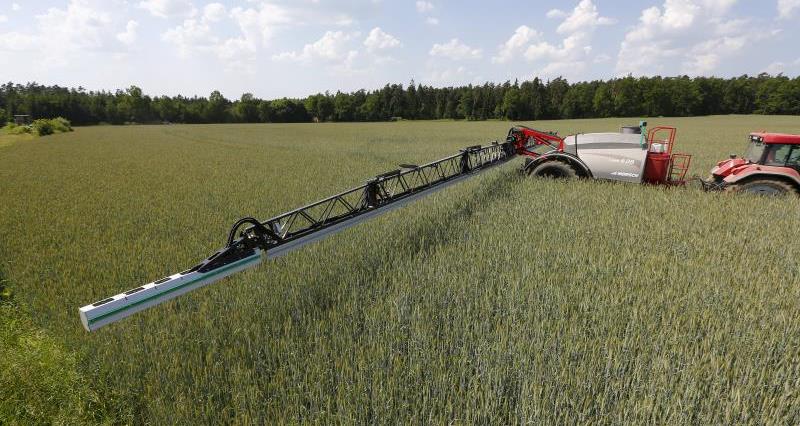Jointly produced by NFU Sugar, British Sugar, and the BBRO, ‘Protecting the Sugar Beet Crop: The Homegrown Sugar Industry Virus Yellows Pathway’, details the various workstreams of the pathway including Integrated Pest Management and innovative grower practices, traditional breeding, gene editing, sustainable spray programmes, and seed treatments.
No silver bullet, but progress in the pipeline
The cross-industry Virus Yellows Taskforce, spearheaded by the British Beet Research Organisation, is investing millions of pounds each year in cutting-edge research into potential virus control measures.
While there is no individual silver bullet, the ambition of the taskforce is to develop an integrated approach of stacked controls to protect against the disease.
IPM
The BBRO continues to assess the impact of novel IPM (integrated pest management) practices on the sugar beet crop.Ã˝
Trials which are showing promise include:
- Use of companion crops, beneficial hosts (wildflowers), camouflage and deterrents.
- Application of coloured dyes, masking the colour distinction between plant and soil relied upon by aphids in flight to recognise a host crop.
- AgriOdorTM pellets which repel aphids through scent.
There are plans in place to explore if utilising compounds derived from mature sugar beet can help to limit Virus Yellows infection and this work will get underway from 2026 onwards.
Seed model
This year, NFU Sugar and British Sugar announced reforms to the UK sugar beet seed model which gives growers more choice and flexibility, supports innovation and brings Virus Yellows tolerant varieties to market sooner to accelerate adoption.
Sustainable spray programme
Work continues in trials to test new aphicides for the sugar beet crop, with the aim to work towards full approval of a 3-5 established sustainable spray programme from 2026 onwards.
Genetic editing research
We welcomed the government’s announcement in September 2024 that it intends to move forward with secondary legislation of the Genetic Technology Act 2023, which will support our research into gene editing.
British Sugar has entered a collaboration with the agriculture biotechnology company Tropic, to explore how to genetically edit sugar beet to confer resistance to the three yellowing viruses that makes up Virus Yellows disease.
The project makes use of Tropic’s Gene Editing induced Gene Silencing (GEiGS®) technology platform, to make minimal and precise gene edits in sugar beet enabling durable resistance to Virus Yellows.
In early 2024, the project received £660,000 of grant funding from Innovate UK’s Farming Futures R&D Fund. This was jointly awarded to British Sugar, Tropic and the world-leading plant science institute The JIC (John Innes Centre). The BBRO (British
Beet Research Organisation) is also supporting the project.
Work to date has focused on mapping the sugar beet genome sequence, generating short interfering RNA (siRNA) expression data and defining the viral target genes.
Tropic has successfully generated Gene Editing DNA solutions (GEiGS®) and tested their efficiency in cells. Multiple solutions with high silencing efficiencies are available for the next stage of the project, where they will be tested for their efficiency in plants.
Alongside this work package, JIC will be developing the Sugar Beet transformation platform which will enable the generation of the GE plants.
What is gene editing?
Gene editing sees precision plant breeding techniques used to change a selected, very specific sequence within the genome of a crop.
It is different from genetic modification because no new genes from other species are incorporated into the plant; instead, changes are made to the plant’s own DNA. This process can and does happen in nature, but gene editing speeds up the process to deliver results faster.
By the end of the decade, it is hoped that the project team will have confirmation of Virus Yellows resistance in GE plants in the lab.
Performance will then be assessed in field trials in the years that follow. Resistance to BYV (Beet Yellows Virus) is the priority, given it is the most damaging to the crop, but it is hoped that resistance will be achieved against all three viruses that make up Virus Yellows disease.
To find out more about the specific industry strategies for the control of Virus Yellows in sugar beet, see our pathway document.
Impact on growers
The disease is actually a complex of three viruses, spread by aphids and therefore very difficult to control. During 2020 UK growers suffered yield losses of up to 80%, making Virus Yellows disease the biggest current threat to the UK’s sugar beet sector.
With the impact of climate change bringing warmer and wetter winters, this provides a breeding ground for aphids over the winter months. Enabling early spread and infection of spring-sown sugar beet crops in the growing season.
NFU Sugar Board member Alison Lawson said Virus Yellows is “one of the biggest risks” to her sugar beet growing business.
“The perfect storm of 2020 was devastating – we suffered yield losses of 30% across our planted area as well as drastic reductions in associated sugar content.
“We continue to battle against infection and crop losses, but with Virus Yellows representing a complex of three distinct viruses, this fight remains extremely challenging,” she said.
“Virus Yellows continues to constitute one of the biggest risks to my sugar beet growing business.”
NFU Sugar Board member Alison Lawson
Ã˝




